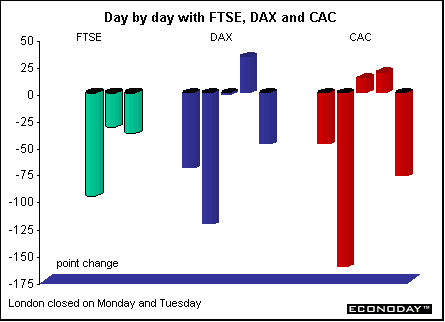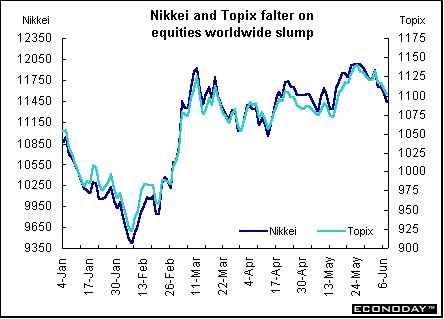Recap of global marketsEurope and BritainThis was a week that the markets would gladly forget. The Paris CAC dropped 6 percent and the Frankfurt DAX fell 4.3 percent. London FTSE 100 managed to drop 3.2 percent in the three days it was trading after the Queen's Golden Jubilee celebrations on Monday and Tuesday. All the indexes have dropped to their lowest levels since October 2001, when stocks were suffering from the post September 11 sell-off.  European markets were hurt as technology stocks plummeted. Intel cut its profit and revenue forecasts, blaming weak demand in Europe. The latest German jobless data did nothing to lift sentiment as the number of unemployed surged by a seasonally adjusted 60,000 in May. (See the indicator scoreboard below.) Also contributing to the general malaise from technology discontent were oil stocks. They fell when crude prices dropped after Russia said it was abandoning its agreement with OPEC to limit production. Economic fundamentals were not on every investor's mind on Friday, when London's FTSE 100 index rose sharply off lows in reaction to England's 1-0 victory over Argentina in the World Cup. AsiaIn general, Asian equities followed here continue to perform better than in Europe and in the Americas. Four of the six indexes are up on the year — the Japanese Nikkei and Topix, the Singapore Straits and the South Korean Kospi. With the exception of the Nikkei, all dropped less than European and American indexes last week.  Despite a good showing in first quarter GDP on Friday, the Nikkei and Topix fell, pressured by the Intel report and investor concerns about the real strength of the Japanese economy. Japanese GDP numbers can be revised significantly and are not particularly trusted by many market players. And with Japanese domestic demand weak, they see little chance that corporate profitability will return soon. Japanese capital flows in the week ending May 31 showed Japanese investors as again strong net buyers of foreign equities and bonds, while foreign investors were again net buyers of Japanese equities. Foreign investors also showed renewed buying interest in Japanese bonds. | ![[Back To Archive]](../../../images/backtoarchive.gif)